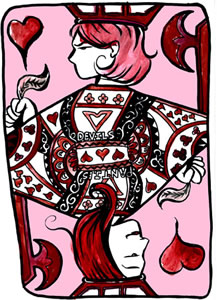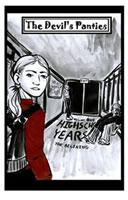Quasi-autobiographical comics come with a risk alert stamped on the box: "Warning: may be needlessly introspective, self-conscious, ceaselessly overnarrative." "Show, don't tell" becomes "Tell, tell, then show your head. And other heads." The desire to impose story upon life, unassisted and unmitigated, pollutes the anecdote. (Alternatively, one might simply make everyone housemates and inject giant robots, at which point all bets are off.)
Thankfully and refreshingly, Jennie Breeden's The Devil's Panties resists this trap. By and large, we follow Jennie through her comic-shop-working, art-school-graduate, geeky-fetishy life. Jennie's outgoing (if not necessarily extroverted), in touch with herself, and fun. She's got third-wave feminism down; she's about confidence (which is not to say that the world doesn't wear her down on occasion). She wears awesome boots and a labrys t-shirt. She's cool.
Strips may cluster around events, but they aren't really stories. These are moments. These are fragments of what happens to be: working, clubbing, socializing, congoing, overall comics/anime/skiffy/Buffy geeking, familial interaction, snuggling with the boy. (There's also LARPing, but Breeden reserves this for a separate comic, Geebas on Parade. Geebas is beyond the scope of this review, but inhabits the same general universe. It's also worth your time, but demands much more context.)
The Devil's Panties isn't, for the most part, polished, honed work. Breeden is more than capable of it, but this is neither the time nor the place. The comic springs up daily, except for when it needs to be every other day, and makes note of a thing: simple pleasures, self-revelation, argument, or stupid bloody come-ons from boys who mistook doggerel for flirtation. The point is made, the moment happens, and the day continues.
|
Volume One: The High School Years – The Beginning
Last year's print-only strip collection, The High School Years – The Beginning, is an impressive companion to the online comic. These are much more structured strips than we see online, with a solid rhythm, a more polished feel, and a greater sense of passing time (high school through the first few weeks of university).
The short stories told here are easy to identify with: subverting clothing-related smackdowns by the principal, trading one's brother for a cool shirt, getting hassled by bullies. They stand alone well; you don't need to have read the webcomic to enjoy these, although it doesn't hurt to know what Jennie will become. The slender volume's only five bucks and shipping. (Buy it here) You can't go wrong. |
On the weekends, of late, we get concept art and stunning portraiture which hint at Breeden's potential. When Breeden feels like it, we also get single panel one-liners. These haven't the appeal of the core comic; at worst, they strain to make their gags felt, and many are amusing at best. It's also unclear, given their positions within the main archives, whether we're meant to see them as Devil's Panties comics or filler; Keenspace's linear archiving style makes it awkward to follow apparent forks. (The print anthology filters these considerably, suggesting "kind of but not really.")
Deviations aren't necessary; Jesus and (much more infrequently) Satan make the occasional appearance, but they suffer from the same fate as one-shots (with some exceptions). For the most part, though, these appearances were fairly early on; they show up when they need to, now, and regular life supersedes them. It's Jennie who carries on, Jennie who asks questions, and Jennie who lives out life — spiritual manifestations often come across as bolt-ons. Ironically, more symbolic strips still work, presumably because they're more about Jennie than divine characters. The finest moments here aren't about characters; they're about people.
 Simplicity reigns supreme here. It's awesome how little Breeden needs to get the point across and make it clear. That's not to say her recent experiments with colour haven't been effective (her use of spot colour in the past few months has been lovely). It is to say that Breeden does a lot with very little. Ink washes, yes; needless Photoshoppery, no. (If anything, early strips were slightly too rough; over time, that's evened out.) Deceptively simple, flowing, black line, details and flourishes here and there. Hand lettering (mostly), hand ballooning. No nonsense.
Simplicity reigns supreme here. It's awesome how little Breeden needs to get the point across and make it clear. That's not to say her recent experiments with colour haven't been effective (her use of spot colour in the past few months has been lovely). It is to say that Breeden does a lot with very little. Ink washes, yes; needless Photoshoppery, no. (If anything, early strips were slightly too rough; over time, that's evened out.) Deceptively simple, flowing, black line, details and flourishes here and there. Hand lettering (mostly), hand ballooning. No nonsense.
Breeden's fluid style lends itself particularly well to character motion. (She's at her best depicting the dancing Jennie, and has been since the beginning.) Jennie crumples palpably from bodice-wearing agony. She flops drunkenly and bolts upright with admirable elasticity. Others in the strip don't benefit so strongly by comparison, though standalone illustrations suggest that it's only a matter of time until the less practiced personages share Jennie's kinesis and flexibility.
That said, they don't need to be as flexible as Jennie, since she's who we're watching, and it's her world. If Jennie bends a little more, it's because Breeden knows how Jennie moves better than any of the others, and that's what she's working to convey. There's no hope that we can get inside the skin, but damned if we don't get some sense of how it feels to be the one pushing against it.
And that's the point, right?
 The Jennie here is a bit different to her online counterpart. Everyone's different in high school; in Jennie's case, her hair is longer, glasses are worn, and her demeanour's much more reserved. The extroversion goes to one of her friends, an assertive punk (original owner of the boots) who remains nameless, until Jennie heads off to college. If anyone receives strong characterization here, it's the punk girl.
The Jennie here is a bit different to her online counterpart. Everyone's different in high school; in Jennie's case, her hair is longer, glasses are worn, and her demeanour's much more reserved. The extroversion goes to one of her friends, an assertive punk (original owner of the boots) who remains nameless, until Jennie heads off to college. If anyone receives strong characterization here, it's the punk girl.
I don’t think this is mentioned in the review but Comixpedia interviewed Jennie Breeden last year. Click here to read it.
Also I just missed meeting Breeden at this year’s SPXPo – she was away from her table and I bought the book mentioned in the review from her tablemate.
It’s amazing what Jennie breeden can do with a few expressive strokes of a brush. Her comics are fun and emotive! 😀